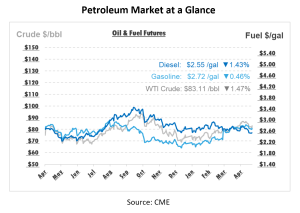
What’s That: International Standards Organization (ISO)
Whether you’re refueling your car or reviewing your monthly expenses, the International Standards Organization helps ensure that every drop counts towards quality, safety, and efficiency. Today’s What’s That Wednesday is focusing on the ISO and how it’s shaping the global energy landscape, one standard at a time.
What is the ISO?
The International Standards Organization (ISO) is an independent, non-governmental international organization that develops standards to ensure the quality, safety, and efficiency of products, services, and systems. With members from 165 national standards bodies, the ISO fosters innovation and solutions to global challenges across all sectors, including the oil and gas industry.
The Role of ISO in the Oil and Gas Industry
The oil and gas sector is a complex, high-stakes industry where safety, environmental, and quality standards are paramount. That’s where the ISO comes in, providing frameworks and guidelines to help companies navigate these challenges effectively. Several ISO standards are tailored specifically for the industry, addressing everything from the extraction and production processes to transportation, storage, and environmental protection. Key standards include:
ISO 29001: ISO 29001 outlines the requirements for a quality management system specifically designed for the oil and gas industry. This standard is tailored to the petroleum, petrochemical, and natural gas sectors’ unique needs, focusing on the reliability and quality assurance of products and services within these industries. It addresses the complexity and specific risk factors associated with oil and gas operations, from exploration and production to refining and distribution.
ISO 14001: ISO 14001 is a universal standard applicable to any organization seeking to manage its environmental responsibilities in a manner that contributes to sustainability. ISO 14001 focuses on minimizing harmful effects on the environment caused by its operations and achieving continual improvement of its environmental performance. This includes comprehensive management of environmental risks, from air and water pollution to soil contamination and biodiversity impact.
ISO 22241: ISO 22241 is a standard series that outlines the specifications and requirements for diesel exhaust fluid (DEF), a key component used in the Selective Catalytic Reduction (SCR) systems of diesel-powered vehicles to reduce harmful nitrogen oxide (NOx) emissions. This standard encompasses several aspects critical to ensuring the quality and performance of DEF, including its production, storage, and handling. Specifically, ISO 22241 details the chemical composition of DEF, ensuring it is precisely a 32.5% solution of high-purity urea in deionized water. This formulation is essential for the effective reduction of NOx emissions in vehicle exhaust systems, contributing to cleaner air and meeting stringent environmental regulations. By adhering to ISO 22241, manufacturers, suppliers, and consumers can ensure the compatibility and efficacy of DEF, maintaining the performance of SCR systems and supporting global efforts to reduce air pollution from diesel engines.
The Future of the Industry and ISO’s Role
As the world increasingly shifts towards sustainable energy sources, the oil and gas industry is at a crossroads. The ISO is playing a critical role in this transition, developing standards that promote sustainable practices, energy efficiency, and the integration of renewable energy sources. For instance, standards like ISO 50001, which targets energy management, help companies optimize their energy use, reducing greenhouse gas emissions and operational costs.
It is also adapting its standards to accommodate technological advancements in the oil and gas sector, such as digitalization and automation. These changes not only enhance efficiency and safety but also pave the way for innovative solutions to meet global energy demands sustainably.
What This Means for You, the Fuel-Buying Customer
For consumers, the adherence of oil and gas companies to ISO standards translates into a more reliable, safer, and environmentally conscious energy supply. It ensures that the fuel you use for your vehicles, heating, and electricity generation meets high-quality and sustainability standards, contributing to a safer and greener planet. By supporting companies that adhere to these standards, you play a part in promoting responsible energy consumption and production.
The ISO is setting the bar for quality, safety, and environmental stewardship, and not only ensures the reliability of today’s energy supply but also guides the industry towards a more sustainable and innovative future. As consumers, understanding and supporting these standards can help us contribute to a more sustainable world, one fuel purchase at a time.

This article is part of Daily Market News & Insights
Tagged:
MARKET CONDITION REPORT - DISCLAIMER
The information contained herein is derived from sources believed to be reliable; however, this information is not guaranteed as to its accuracy or completeness. Furthermore, no responsibility is assumed for use of this material and no express or implied warranties or guarantees are made. This material and any view or comment expressed herein are provided for informational purposes only and should not be construed in any way as an inducement or recommendation to buy or sell products, commodity futures or options contracts.





